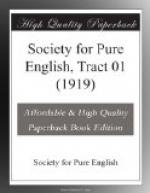II. The large and necessary importation of foreign words into the English language has undoubtedly weakened its ancient word-making powers; and while all fantastic and awkward inventions and ill-sounding compounds should be avoided, it seems desirable to give at least a fair chance to words formed out of English material. Such new English words, especially new English compounds, need, it would seem, to be used for some little time before we can overcome our dislike of them, while terms of Greek and Latin origin, however cumbrous and unsuitable they may be, are accepted almost without question. We would discourage such unimaginative and artificial formations, and on principle prefer terms made of English material, which are easily understood and naturally spoken by English-speaking people.
III. Until recent years English writers were in the habit of experimenting somewhat freely in language, and to their word-coining activity we owe many of our current and most useful terms. But since Carlyle there have been until lately few experiments of this kind. Many words are added every year to the English vocabulary, but they are for the most part the deliberate creations of scientific writers; while the very men who should concern themselves with this matter stand aloof, and leave it to those who by nature and profession are least sensitive to the aesthetic requirements. We would therefore encourage those who possess the word-making faculty to exercise it freely; and we hope in the future that suggestions from our members may help men of science and inventors in their search for new and appropriate names.
IV. Although men of letters may occasionally add to the resources of the language by word-coinage, their main activity is and must be one of selection. They are forced, for the most part, to choose their vocabulary from the supplies at hand, and by their choice they do much to give prevalence to the words which meet with their approval. Now, believing that language is or should be democratic both in character and origin, and that its best word-makers are the uneducated, and not the educated classes, we would prefer vivid popular terms to the artificial creations of scientists. We shall often do better by inquiring, for instance, not what name the inventor gave to his new machine, but what it is called by the workmen who handle it; and in adopting their homespun terms and giving them literary currency, we shall help to preserve the living and popular character of our speech.
V. The present spread of education, and the enforcement of a uniform and town-bred standard of speech throughout the schools of the country, is destroying dialects and local forms with great rapidity. These have been studied by specialists, and their value is fully recognized; but the attitude of the educated classes towards them is still contemptuous or indifferent. This ignorant contempt is to be regretted for many reasons. Not only is some knowledge of dialects




